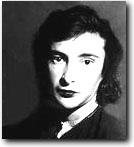Margarita Iossifowna Aliger
Margarita Aliger (real surname Seiliger (Зейлигер), Russian Маргарита Иосифовна Алигер * September 24 jul. / 7. October 1915 greg. In Odessa , Russian Empire ; † 1. August 1992 in Mitschurinez , Moscow Oblast , Soviet Union ) was a Russian-Soviet poet , journalist and translator. The physicist Miron Seiliger was her uncle.
life and work
Aliger's parents were office workers. She first took up a degree in chemistry. As a teenager, she worked in a chemical factory. In addition to the interest in chemistry and the natural sciences in general, talent and interest in poetry also showed very early on. Her first verses appeared in the magazine Ogonyok as early as 1933 . After completing her studies in chemistry, she studied from 1934 to 1937 at the Gorky University in Moscow at the Institute for Literature . The main idea behind her poetry was the heroism of the Soviet people during industrialization .
Even while studying literature, she made several trips through the Soviet Union and worked on post-poetry.
In 1938 she published her first volume of poetry "God roschdenija" ( year of birth ), in which she expressed the youthful optimism of the country's reconstruction work . The poem “Sima ėtogo goda” ( This year's winter ), also published in 1938, deals with a particularly sad event in her life, the death of her first child.
During the Second World War , driven by the death of her husband, she decided to live in besieged Leningrad as well as on other sections of the front.
The high point of her creative work was the poem Soja (German extract) from 1942, whose heroine Soja Anatoljewna Kosmodemjanskaja , a young Russian girl, suffers the hero's death. This work was one of the most popular poems during the Soviet era.
The drama "Skaska o prawde" (The Tale of Truth) from 1945 was also dedicated to the partisans.
Margarita Aliger's poetry, published between 1940 and 1950, was characterized by optimism, as reflected, for example, in the 1953 poem "Leninskije gory" ( Lenin Mountains ). In her poems, she tried not only to analyze the situation in her home country, but also to show the particular optimism that can be found in the poem Twoja pobeda ( Your victory ) from 1944 to 1945.
In addition to dramas and poems, Margarita Aliger also wrote numerous essays and articles on Russian literature . Her travels were reflected in lyrical and reportage reports. Particular attention should be paid to “Japonskie sametki” ( Japanese notes ) and “Tschilijskoe leto” ( Summer in Chile ) from 1965.
Margarita Aliger worked as a writer and as a translator of Ukrainian, Azerbaijani, Uzbek, French and other poetry .
literature
- Nadeshda Ludwig (Ed.): Handbuch der Sovietliteratur (1917–1972) VEB Bibliographisches Institut Leipzig 1975
- Elaine Feinstein : Three Russian Poets: Margarita Aliger, Yunna Morits , Bella Achmadulina . Manchester: Carcanet Press, 1976
Web links
- Literature by and about Margarita Iossifowna Aliger in the catalog of the German National Library
- Article Margarita Iossifowna Aliger in the Great Soviet Encyclopedia (BSE) , 3rd edition 1969–1978 (Russian)
| personal data | |
|---|---|
| SURNAME | Aliger, Margarita Iossifovna |
| ALTERNATIVE NAMES | Seiliger, Margarita Iossifovna; Алигер, Маргарита Иосифовна (Russian) |
| BRIEF DESCRIPTION | Russian-Soviet poet |
| DATE OF BIRTH | October 7, 1915 |
| PLACE OF BIRTH | Odessa , Russian Empire |
| DATE OF DEATH | August 1, 1992 |
| Place of death | Michurinez , Moscow Oblast , Soviet Union |
